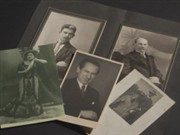|
|
||||
|
|
by Donald Levit  It seems odd at first, that the story of an Eastern European Jewish family forced into diaspora, should be directed by Tomoko Fujiwara and DigiBeta-screened at Japan Society. But there are connections for The Sirota Family and the 20th Century/Shirota-ke no nijyu seiki. One branch gravitated through Of a musical and music-impresarial background, they were forced from Kiev to Kamyanets-Podilsky, Ukraine; thence, fascism on the gallop, various members arrived in, often only to move through, Vienna, Warsaw, Paris, Drancy to Auschwitz-Birkenau, even to the in-exile Polish 10th Mounted Rifles in North Africa and at Normandy and, in her case, to Tokyo, California and New York. That the film found financing, Beate -- “BG” -- revealed, was miraculous, from its director’s chance metro encounter with the trustee of half the estate of a student of Beate’s father Leo, himself the lynchpin around which all revolves and to whom in essence all is love-letter homage. “Except where otherwise indicated,” the score is restoration of Leo’s recordings from thirty hours’ reel-to-reels which the daughter had not even known she had, largely of his radio performances when in the ‘50s he taught at the St. Louis Institute of Music. “A requiem to people who have been persecuted and died in war, the family tale reads like a miniature history of the 20th century.” In ways, it does indeed, although the assertion must be taken as symbolic, for the hundred years encompassed so much. Lenne Hardt’s narration is pious and, with a feeling of distance in overall point of view, contributes to a bloodlessness about these years and events, arguably too uncomfortable to confront in any other way. It was actually outside the film itself, afterwards, that Beate acknowledged that Judaism was something so foreign, so unique in Tokyo of the ‘30s and ‘40s that they could neither practice nor be aware of it until, as the screen points out, Goebbels’ interest and influence isolated her at the German Lutheran School, from which she transferred to the American School. Nor does her mother figure much, a lonely woman after the intellectual headiness of Multilingual speaking about “Papa,” Beate is not the sole interviewee, familial and otherwise. Siblings, cousins, aunts and uncles scattered in different directions, Leo and his brood took to Beate had already left for private SF20C spreads itself thin in following sets of scattered relatives and venturing into a Polish Catholic cemetery in |
||
|
© 2025 - ReelTalk Movie Reviews Website designed by Dot Pitch Studios, LLC |



